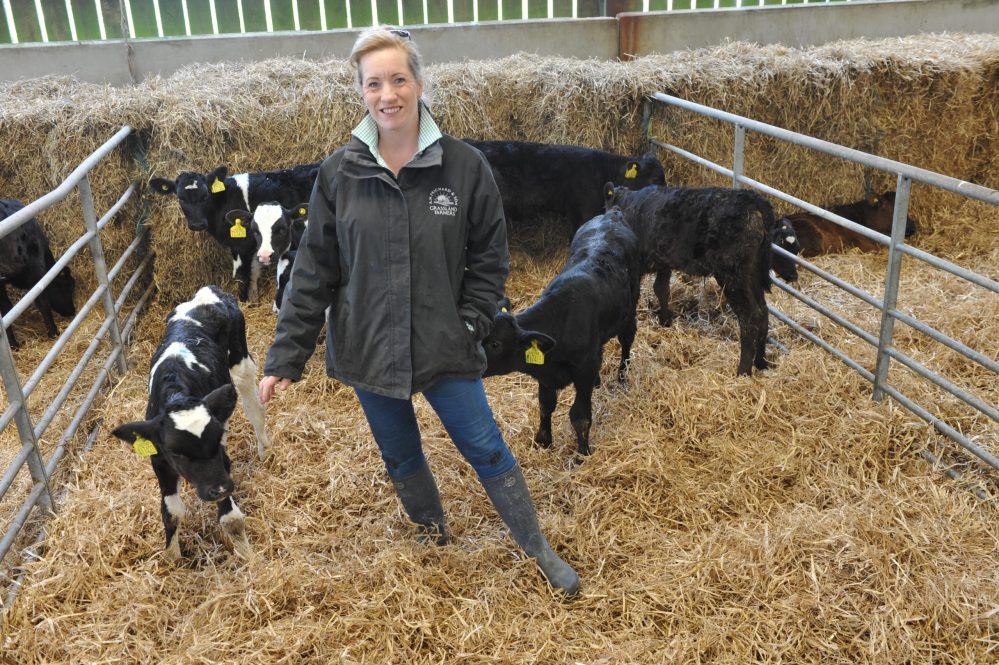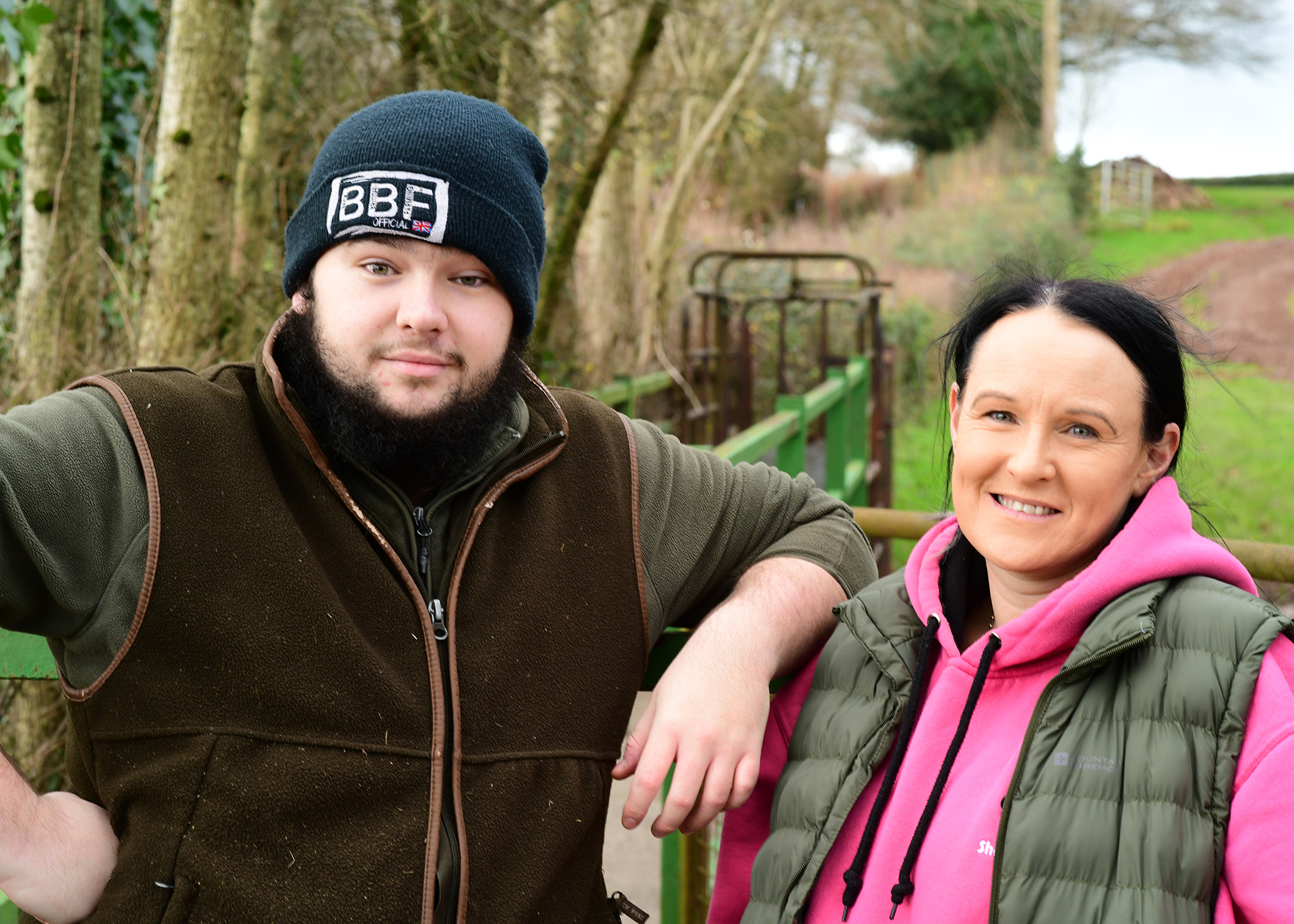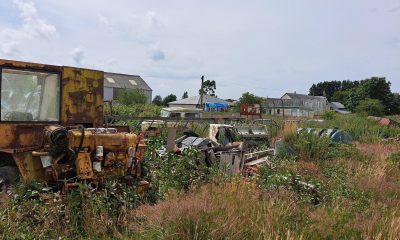Farming
Child safety on farm a priority

ON MAY 2017, a nine-year-old boy was seriously injured at a Devon farm. Travelling as a passenger, he had toppled off an ATV being driven by a 13-year-old. The younger boy, whose leg was badly crushed, spent weeks in hospital, needed a skin graft from his back and he underwent weeks of intensive physiotherapy. The older boy was undoubtedly traumatised too. In January this year, the farm partnership responsible for the boys’ welfare and safety were fined £28,333 and ordered to pay costs.
This shocking incident, like many others throughout Wales and the UK, could have been avoided if simple safety precautions had been taken and the law adhered to. Farms and farmyards can be hazardous places for every age group, but children are particularly at great risk if allowed to play, visit or help out around the farm unsupervised.
The Wales Farm Partnership (WFSP), a collaboration of all the key agricultural stakeholder organisations in Wales, has issued a warning to all rural families reminding them that ‘children should not be in the workplace, it is illegal for under 13s to ride on agricultural vehicles or machinery and work equipment like ATVs should not be used by children.’
The WFSP is determined to encourage farmers everywhere to reduce the risk of on-farm accidents through its ongoing hard-hitting farm safety awareness campaign. This month, its members will remind farmers and foresters everywhere that the Health & Safety Executive (HSE) will not hesitate to take appropriate enforcement action against those that fall below the required standards, especially where children are involved.
Being struck by or run over by farm machinery or visiting vehicles is the biggest single cause of children being killed on farms. Accidents most frequently reported in the UK involve falling from tractors and ATVs or quad bikes. But danger lurks everywhere! Year after year, we hear of tragedies involving children on farms drowning or being asphyxiated; being crushed; hit by falling objects or collapsing stacks and injured by animals.
At a working farm, unsupervised children, who are naturally inquisitive and often fearless, can face risk from almost everything in sight as well as the human element – the unsuspecting family member, visitor or delivery person who drives onto the yard, unaware children are running around freely.
Brian Rees chairs the WFSP. An experienced farm safety trainer and one of Farming Connect’s approved farm safety mentors, Mr Rees is also a farmer whose three children, all now grown up, were brought up on his family’s working farm in mid Wales.
“Farmers themselves often misguidedly believe that farm children understand farm risks, but most children who die or are injured in farm incidents are family members, which tells its own undeniably sad story.”
He advises that staying up to date with best practice, knowing your legal obligations and making sure that children are supervised at all times is essential.
“The most important point is that, to meet your legal duties and keep children safe, children should not be allowed in the farm work place (and for young children they should enjoy outdoor space in a secure fenced area).
“By implementing a few straightforward safeguards and by ensuring proper supervision of children at all times, every farming family can and must reduce the risks of life-ending or life-changing accidents.”
Any access to the work area by children under 16, for example for education, or knowledge experience, should be planned and fully supervised by an adult not engaged in any work activity.
Children under the age of 13 years are specifically prohibited from driving or riding on any agricultural machine.
“If you’ve got a computer or smartphone, you can get up to speed very easily by accessing guidance on best practice from both the Health & Safety Executive (HSE) website and also that of the Farm Safety Foundation, which works closely with the HSE and the industry throughout the UK.
“The WFSP is intent on raising awareness to reduce the number of farm incidents, but to achieve that, we need farming families to work with us, to take advantage of the guidance, training and mentoring available, much of it fully funded or subsidised by up to 80% for farmers registered with Farming Connect,” said Mr. Rees.
Eligible farmers can apply for up to 22.5 hours of fully-funded, confidential on-farm guidance from one of the approved ‘farm health and safety’ mentors, who are part of Farming Connect’s mentoring programme.
“Most farmers are aware that they sometimes take short cuts and don’t always follow the correct safety guidance, but having an expert to informally visit your farm and point out, in complete confidence, what steps you can take to minimise or eliminate risks could reduce the risk of accidents for many families.”
Farming
Transition milk trial targets calf health at Pembrokeshire dairy farm

A PEMBROKESHIRE spring-calving dairy farm is introducing a new feeding system for newborn calves in what is to be thought the first trial of its kind in a large-scale herd.
Will and Alex Prichard are feeding enriched pasteurised transition milk to calves in their first 10 days of life rather than abruptly transitioning them to whole milk or milk powder.
Research has shown that feeding transition milk to young calves vastly improves their digestive system’s ability to digest milk, with those benefits sustained to keep them healthy and thriving as they grow.
The Prichard’s, who produces milk from 500 spring calvers, were keen to trial this feeding system in their own herd at Escalwen, Letterston, in the hope of improving calf health and wellbeing.
They are doing this with support from the Farming Connect Try Out Fund, an initiative that funds individuals and groups of farmers and growers to experiment with ideas and bring them to life.
Although the health benefits from enriched pasteurised transition milk have previously been demonstrated in all-year round calving herds in the USA and Canada, it is believed to be the first time it has been trialled in a large-scale block calving herd.
Getting the correct nutrition is crucial in the early stages of a calf’s life.
Even after a few hours the animal loses its ability to absorb antibodies – there is a dramatic reduction within 10 hours of birth and, by 20 hours, that capacity has all but gone.
To establish the effectiveness of the transition milk product, calves born at Escalwen this spring are being blood tested for antibody levels.
The transition milk is also being tested for its immunoglobulin (IgG) status before and after it has been pasteurised.
If it needs enriching this is being done to raise the BRIX value to a minimum of 12.5%. It is then fed to calves during their first 10 days of life.
An optical refractometer is being used to measure milk BRIX as it gives an instant result but by the end of the study all batches of transition milk will have been tested for IgG using Radial Immunodiffusion Assay at the University of Edinburgh.
Vet Dr Ryan Davies, director of Veterinary Technical Consulting Ltd, who is providing expert input into the project, says this will enable the accuracy of milk BRIX to be determined to quantify IgG status.
“We will then assess this against the health status of the calves,’’ he says.
Mortality from neonatal calf diseases such as diarrhoea, pneumonia and navel and joint ill is being monitored and antibiotic use too, as well as daily liveweight gains – at birth, at 30-35 days and at weaning.
The Try Out project hopes to understand more about how dairy farmers with large block calving herds can consistently produce animals that are healthy, productive and have a good quality of life through optimising calf health with preventative healthcare.
More productive animals mean less carbon emissions, higher standards of animal welfare and a reduction in antibiotic usage.
Not only do Will and Alex hope to reap the benefits in their own system but that other farmers will too when the findings are shared with the industry at the end of the project.
“Having the ability to acquire extra resources at the busiest time of our year has allowed us to monitor the results of our actions in a more scientific fashion,’’ says Will.
“Funding large scale testing is telling us so much about what is happening in our own herd environment and most importantly what behaviours and protocols are driving tangible improvements in herd health and antibiotic reduction.”
They had already made big gains in improving calf health before this project got underway.
The five-year average for morbidity in their pre-weaned calves from 2018-2022 was 45%, in line with the national average of 47% – in 2023 it was reduced to 17%.
Use of the Highest Priority Critically Important Antibiotics was reduced from 1.98mg/ population corrected unit (PCU) in 2022 to zero the following year.
Farming
Animal health and welfare workshops help family farm shape future business

AN eagerness to learn new skills and knowledge is helping mother and son Dianna and Iestyn Spary to continually improve their livestock farming enterprise and build a financially sustainable business fit for the future.
Technical expertise and good business sense are not qualities the Sparys lack since embarking on an impressive number of Farming Connect workshops, covering a range of animal health and welfare topics.
“It’s been an amazing opportunity, we have learned so much that we can apply within the day to day running of our farm and herd, and we can draw on that knowledge as we look at developing new enterprises and diversifications,’’ says Dianna.
She is the fifth generation of her family to farm at Goytre Farm at New Church West, Chepstow, Iestyn the sixth.
Together they farm 110 hectares, running a Hereford-cross beef suckler herd and also rearing beef cattle purchased as baby calves, including more recently British Blues, taking these through to slaughter.
Although they have been immersed in agriculture all their lives, they recognise that it is an industry that is constantly changing as new research and ideas are rolled out and applied.
This is where the Farming Connect workshops have been so incredibly valuable, says Dianna.
“You are never too old to learn, things are changing all the time. If we hadn’t got involved in attending the workshops, we would never have known about some of those new ways of doing things.’’
From learning how to maximise suckler cow productivity and protecting youngstock health to understanding diseases such as Johne’s and bovine TB, the animal health and welfare training workshops have been “enormously valuable’’, she adds.
The pair have tapped into Farming Connect accredited training courses covering areas such as calf management, health and housing, body condition scoring and safe use of veterinary medicines.
“You name it we have done it,’’ says Dianna.
They were announced the winners of the 2023 Farming Connect Animal Health and Welfare Award at the Lantra Cymru Awards in January.
The knowledge gained through Farming Connect workshops and training has helped inform changes in the business.
“We now monitor cattle weights more closely and have introduced different ways of feeding,’’ Dianna explains.
“We have also been revamping all the cattle sheds and have a couple of new ones that will be going up.
“We’ve also invested in calf jackets and if there are any drops in weights, we are more responsive with feed intakes, little things like that.’’
Iestyn has also benefited from a number of sheep-related topics offered through the animal health workshops.
Through the Farming Connect Advisory Service, they have received specialist veterinary advice on their Herd Health Plan with a focus on incoming stock and biosecurity. They have also had guidance on soil health through the soil clinic.
The Sparys largely use traditional farming methods at Goytre Farm where they have several hay meadows.
All feed is produced on-farm. “By doing everything in-house we know exactly what we are feeding and that’s important to us,’’ says Dianna.
That distinctiveness, which sets them apart from some of the more mainstream farming systems, has given them the confidence to consider establishing a diversification into meat box sales, what Dianna describes as a ‘farm to fork’ approach.
Working with a local butcher who has an abattoir licence, they hope to do everything on-site, from slaughter through to hanging the carcass for 28 days, and then selling cuts direct to the consumer.
“We have also spoken to a chef who is going to produce some recipe cards for us to include in the boxes along with a bit of history of where the meat has come from,’’ says Dianna.
Another future project could be converting stone barns in the farmyard to holiday accommodation.
To help focus their minds on their plans, the Sparys will get guidance at a Farming Connect diversification surgery; they have also signed up for a ‘planning a diversification’ training course and will attend a ‘Dos and Don’ts of Diversification’ event in the coming weeks.
For Iestyn, another form of diversification, into agricultural contracting, has provided a secondary income stream.
His customer base is largely farms with smaller acreages with crops that require harvesting or spraying.
Farming Connect has helped with this process too as Iestyn has gained his Level 2 Award in the Safe Use of Pesticides (PA1) and Safe Application of Pesticides Using Vehicle mounted Boom Sprayer Equipment (PA2).
He also offers field maintenance and fencing and works on a neighbouring farm during the lambing season.
This is where Farming Connect has again helped; through the animal health workshops, he has covered modules advising on the prevention of lambing losses and lameness, improving lamb performance post-weaning and parasite controls.
Dianna says the opportunities available through Farming Connect have really helped to drive the family farming business forward.
“We have a good relationship with our local Farming Connect development officer Lisa Powell, she has been brilliant in giving us advice on which courses and workshops are right for us and signing us up for those,’’ she says.
All your achievements, training and knowledge transfer activities are saved within your personal, online Storfa Sgiliau account, the unique, online professional development tool, available for you to view and download at any time from your BOSS (Business Online Support Service) account.
Farming
E-Tickets now on sale for Pembrokeshire County Show 2024

E-TICKETS are now on sale for this summer’s Pembrokeshire County Show, the largest county agricultural show in Wales. Preparations are coming together well for what is set to be a fantastic two days of livestock, competitions, attractions and much more.
General entry tickets for the show, taking place on Wednesday and Thursday, 14 & 15 August, are now available at an ‘early birds’ rate online from the website. Ticket prices have had to increase slightly to cover costs but still remain below 2019 charges. The early bird rate for Adults is £15, children £8 (5-16 years), Carers as well as children four years and under are free. Please visit: www.pembsshow.org to purchase your e-tickets.
Adam Thorne, President of Pembrokeshire Agricultural Society said, “At the event in August visitors will be able to tickle their tastebuds in the Castell Howell Food Hall, marvel at the livestock classes, enjoy watching the dog agility, be wowed by the showjumping, explore the horticulture, arts and crafts entries.
Shop ‘til they drop in the Country Market area, which will showcase over 40 quality local and award winning product and craft stalls and much more.”
Pembrokeshire Agricultural Society Membership packages are also available and these include admission to the Show and the Members’ Area. Purchasing membership of the society will support its aim to promote, advance and improve agriculture, horticulture and rural crafts and skills by the improvement of livestock and the demonstration and showing of livestock, machinery, crafts, products, methods and processes connected with agriculture and agricultural education in particular by the holding of an annual show. Full details are available on the website: Become A Member | Pembrokeshire County Show | Pembs Agricultural Society (pembsshow.org)
Putting together this event is hard work and requires an enormous effort by the staff, volunteers and trustees of Pembrokeshire Agricultural Society. The Society is indebted to so many for their commitment and support in helping host the event.
A special mention must go to the county show sponsors. Pembrokeshire Agricultural Society is proud to have many local, regular, sponsors who make the event possible.
Sponsorship Director, Richard Cole, said, “Sponsorship and Pembrokeshire County Show have been a successful combination for the last 45 years. Sponsors have enjoyed promoting their businesses through the varied mediums of banners, announcements, show rings, buildings, equine and livestock classes and championships over the years. It isn’t too late. If you’d like to discuss becoming a corporate sponsor please complete the form on our website: www.pembsshow.org.”
-

 News2 days ago
News2 days agoPolice investigating after woman found dead on beach near Pennar
-

 News2 days ago
News2 days agoPolice discover body in search for Luke Stephenson, 19
-

 News2 days ago
News2 days agoCouncillors block Milford Haven boxing event – promoter to appeal
-

 Crime3 days ago
Crime3 days agoLlandissilio man accused of making hundreds of child abuse images
-

 Business7 days ago
Business7 days agoLargest Welsh port appoints communications and marketing director
-

 Business3 days ago
Business3 days agoLidl GB eyes Pembroke Dock for new larger supermarket
-

 News17 hours ago
News17 hours agoBeautiful, funny and lovely: Family pay tribute to Sian Batchelor
-

 News3 days ago
News3 days agoSearch efforts continue for missing teenager Luke Stephenson
























